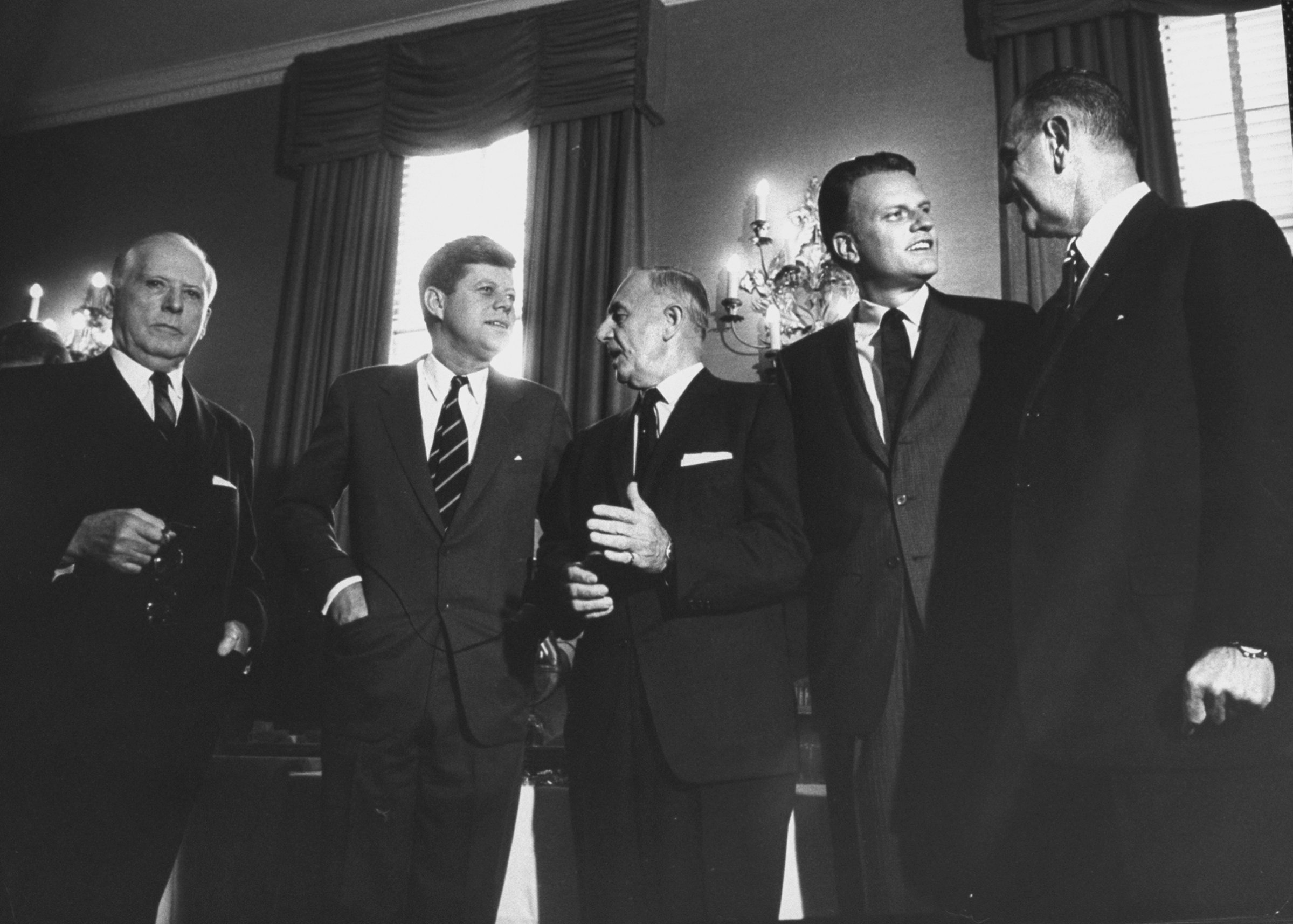
It was January, 2006 the first time we went to visit Billy Graham at his home in Montreat, North Carolina for several days of conversation; we returned a year later, then approached him again in the summer of 2007 after the death of Ruth, his wife of more than 60 years. By this time he was no longer giving interviews; his health was too frail, his legacy too valuable to put at risk with a confused remark. But his memory was still sharp, and his spirit strong, and there were still things he wanted to say.
At the bottom of the hill is a stone arch, with the word Montreat etched above it. The Mountain Retreat is at the end of a box canyon, a narrowing stream valley where there isn’t much room between the hills for more than a few houses, the road and a stream. Water cascades down in every direction, veining the hills.
To reach the house you must climb a dense, winding, steeply tree lined road; it’s back of the beyond, the last best place. The final piece of road ends with a weatherbeaten shingle sign reading Private Drive, then chainlink topped with barbed wire, and a set of iron gates. These were installed in 1968, at the insistence of J Edgar Hoover, who was concerned about the death threats. Before that the Grahams were content for protection with signs that said Tresspassers will be Eaten.
Now you are on Graham land, the expanses of mountaintop that Billy and Ruth bought in 1954. This was moonshine territory; when the Grahams would first come up here they’d find the abandoned stills, and camp out for the night in the little log cabin perched precariously on a ledge looking out over the edge of God’s whole creation. It had no heat, no plumbing; now it’s a playhouse, with birds painted on the shutters. When they bought the land it boasted 120 apple trees, 18 springs, and plenty of room for long hikes and quiet meditation. They paid between $12 and $13 dollars an acre. The surveyors had trouble mapping the terrain but decided to call it 200 acres.
It’s a lot more valuable now.
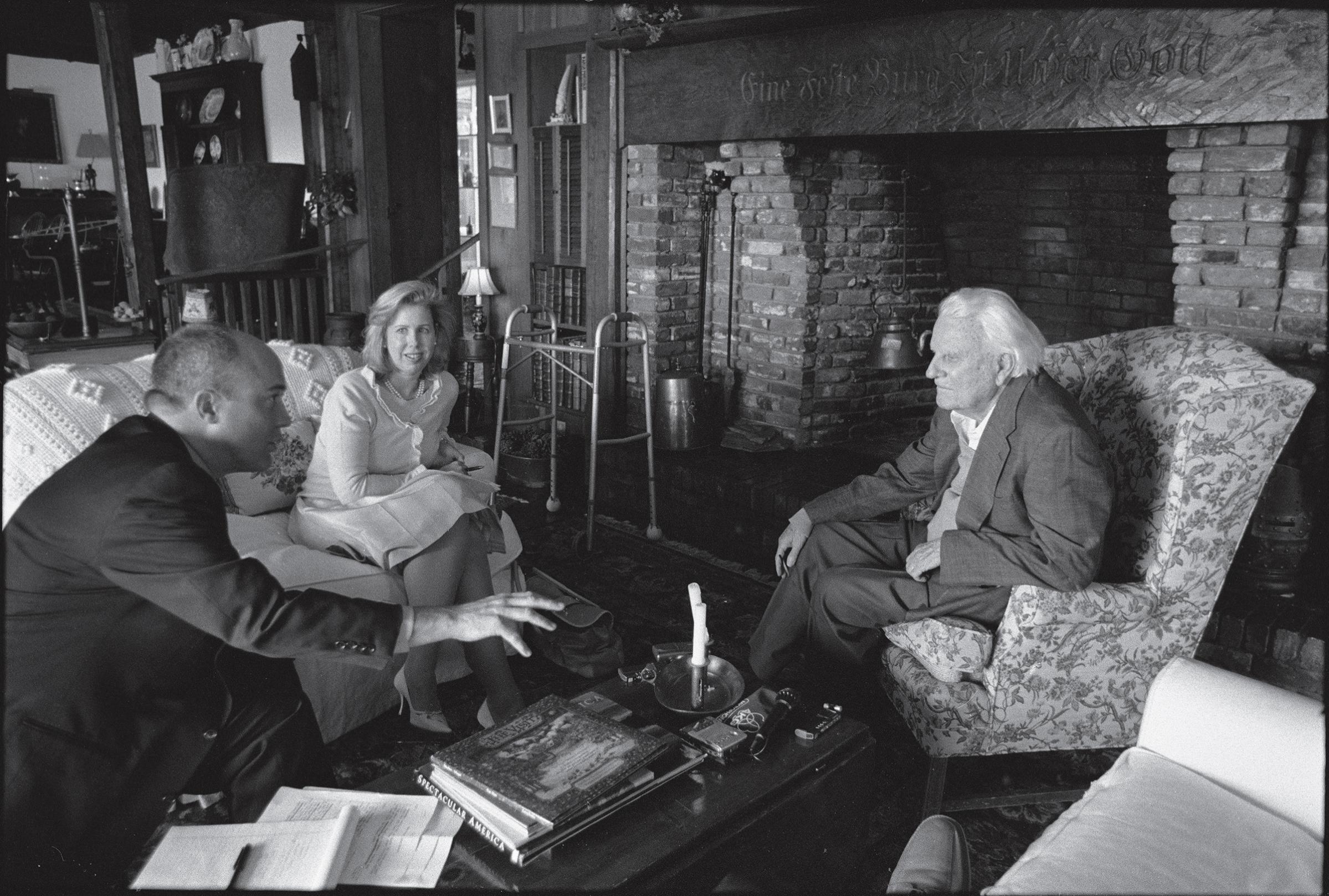
Read more: ‘I Am Selling the Greatest Product in the World.’ Inside Billy Graham’s Evangelism Machine
At the top of the winding drive we came to a not quite ramshackle, brown logged, stone and shingle place that looked like a hobbit lived there. Ruth built their house out of old log cabins and imagination more than half a century ago, a private retreat from his very public life; this is where he came home after his travels, where he finally came home to stay.
When you step inside you can tell this was a house built out of hope, heart and ingenuity. Ruth had toured the counties, salvaging timber from barns and cabins being demolished, and assembled them like a great Lincoln log project on her mountain top. Billy had agreed to two chimneys; but he went off crusading in India that winter of 1956 and she told the workmen “Build fireplaces! Build them faster than you ever have in your life!.” She managed to fit in five. “I’ve always felt it is divine judgment,” she once said, “that the fireplace in his quarters has always smoked.”
In the living room were couches facing each other with white cotton slipcovers, comfortable chairs, a piano covered in pictures, a large window looking out over the edge of the mountaintop. Over the immense brick fireplace was a mantle, made from an old diving board, stained dark and etched in German the words “A Mighty Fortress is our God.” There were shelves of books, a table full of newspapers, but with each passing year his eyesight was fading and reading, even his large print Bible, was becoming impossible.
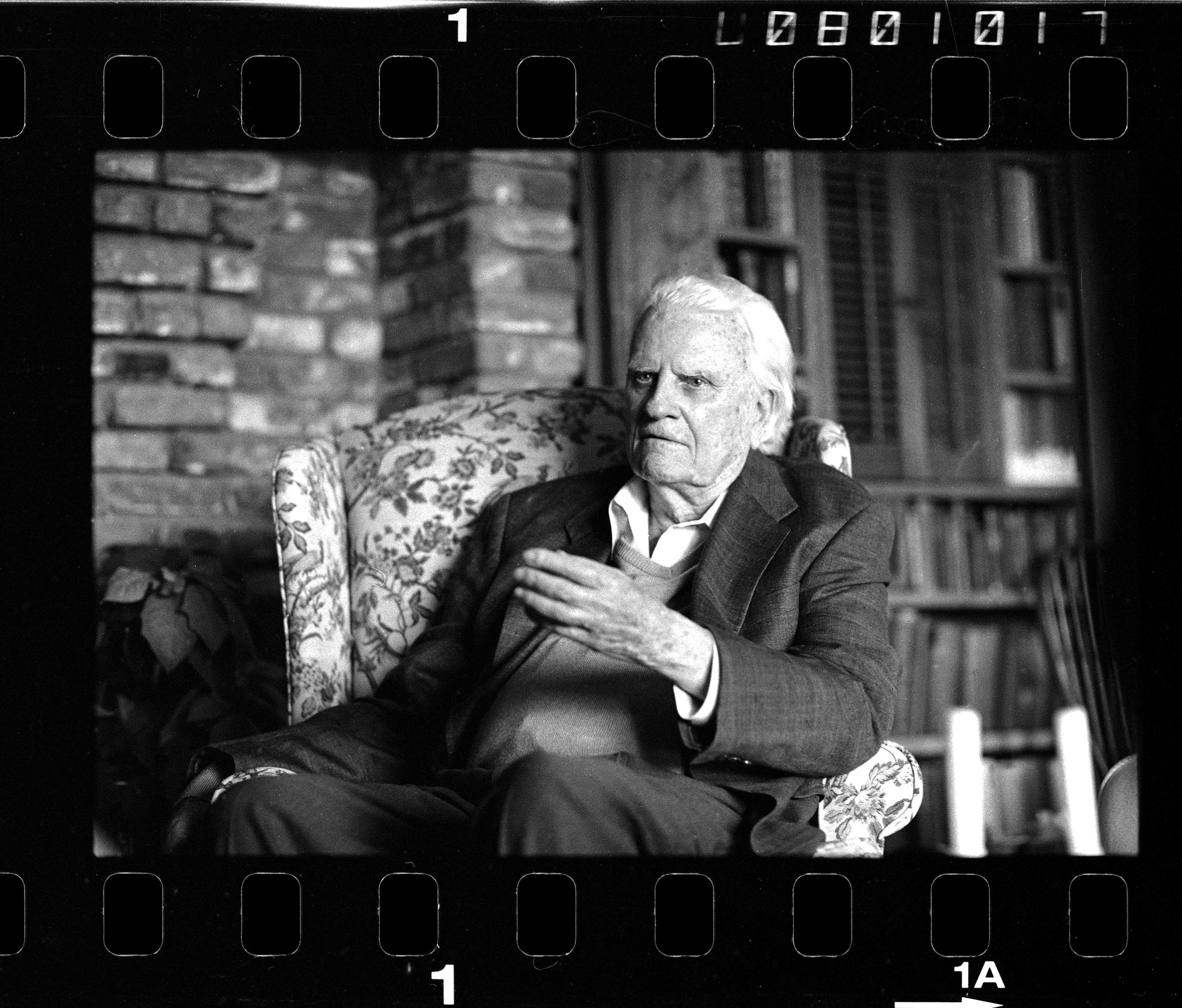
When we arrived for our first visit, Mr. Graham was sitting in the darkened family room, with his walker by him. He rose carefully to greet us, his smile warm and courtly, his voice is quiet, thin, nothing fancy or stentorian, a country boy talking. A tall man with long arms and legs, like God designed him to be seen from a distance, biographer Marshall Frady once observed; he seemed a little smaller, certainly frailer, but every bit as striking, the deep blue eyes were watery but riveting. He lead us down the hall to his private study, a small room lined with bookcases and full of pictures, and a big portrait on the wall beside his desk of Ruth, in her younger days with that immense and vivid smile.
Graham sat in a big chair at his desk, smiling mostly. His feet did not move. He asked about us, and we had a prayer together. He wondered why we were here, why would we want to write a book about him. He doesn’t say so, but of course, there have been so many already. And he was not a comfortable object of attention. He always wanted to divert the gaze from himself to higher things. He worried that if it was about him, it would undercut his mission, bury his message; his lips, he used to say, would turn to clay. Part of this may have been a fear of the sin of pride, which was always there, and even in retirement there was a touch of it still.
We are writing about your relationship with the presidents, we told him, because no one in history has known so many so well, every president since the war, starting with Harry Truman who didn’t like him much, on through Eisenhower who liked him immensely, then one after another after another, most of whom he met ten or twenty or thirty years before they got anywhere near the White House. We think this story matters, and no one had really told it, and it is full of puzzles.
But of course the conversations wandered beyond that, because when you talk to a very powerful man about his friendships with very powerful men, the roads run to the horizon. Families and pressures and power and fame and doubt and fear and purpose.
He had just one challenge to us: “I hope it will just be fair and honest and tell the bad and the good.”
He was concerned that we be aware that his dealings with the Oval Office were a very small part of his life, “Maybe in your minds, it may be exaggerated,” he said. Who would ever argue that they were less close to power than the evidence suggested—evidence that he himself soon began to provide. Part of the answer was quickly clear: even now he barely thought of them as presidents, certainly not Lyndon, or George. Once when he was in Washington and Reagan heard he was in town, he called up and said “You’re staying at the wrong hotel.” He and Ruth went over to the White House in their PJs.
“I’m amazed myself that I was able to see all those men become president,” he said, and it took some doing to remember how to address them, to catch himself, and be appropriately proper.
It was clear they were friends then because they still were now; Lady Bird Johnson had called a few days before we arrived, to talk about the old times. Laura Bush checked in. President Bush 41 has invited him down to receive an award at College Station.
He was all but transparent, which elicited in people an instinct to protect him, because he had no shields. Here was one of the most watched and photographed and admired and analyzed public men of modern history, on stage for more than half a century; by 1957 it was said he was photographed more than Marilyn Monroe. And still he had no filters and guards, beyond, perhaps, his innate impenetrability. Maybe this was one reason he described Reagan as the president he felt closest to….as well as the president he wished he could have gotten to know better. At some point these two genial, magnetic men were unknown, and unknowable.
He was blunt about what he couldn’t explain. “I’m not an analyzer,” he says. “I got a son that analyzes everything and everybody. But I don’t analyze people.“ They were ordinary somehow, and they needed forgiveness just like anyone else, just like he will, he says, when he appears before God. Each was different from the others, he suggested: Lyndon Johnson was a very complex man. But he loved him. Nixon was very reserved. Reagan was the merriest, most optimistic, wore the burdens of office most lightly; Clinton impressed him, so smart, so well informed, so apparently…spiritual.
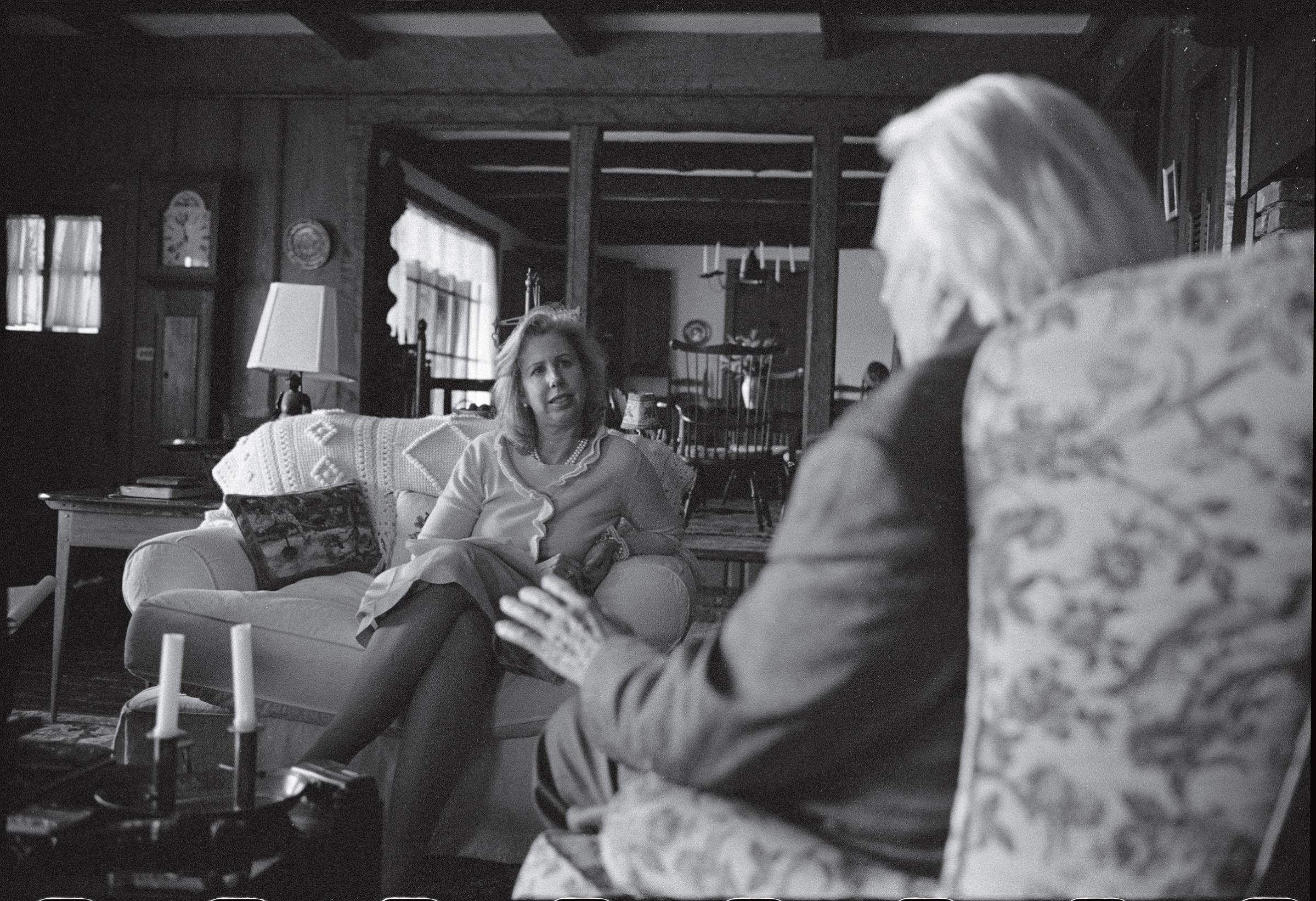
We talk about what had changed over the more than half century that he had spent in and out of the Oval Office. The media environment for one thing, he said, and this reminded us of how astute he was about handling reporters, ever since he beguiled TIME Inc’s founder Henry Luce, how he would go to visit editors and publishers in whatever city he was preaching, get to know the reporters by name. One veteran chronicler of the crusades recalled going into a new city and sitting the first night next to a new reporter who would watch the crowds press into whatever arena it was, filling stadiums that the biggest bands, the hottest sports teams couldn’t fill. “I just don’t get it,” the rookie would muse. “You’re not the first,” the veteran would reply.
In FDR’s day, Graham recalled, “you could fit the whole press corps in the oval office, he says. It’s not like that anymore.” He was still a newshound, read multiple papers, and the important new books; but he knew the information universe had changed. “I have a computer,” he said, “but I don’t know how to work it. But I’ve been told that it’s taking over everything.”
What changed for him personally? As the years went by and the Presidents came to realize that he wasn’t quoting them and that they could talk about their personal problems in private, they could pray together without them reading about it in the papers, he became the indispensable man and their unofficial pastor. “I loved ’em all,” he said. “I admired them all. I knew they had burdens beyond anything I could know or understand.”
People close to the presidents had told us that Graham was unique because, virtually alone among the people a president sees in a day, Billy Graham didn’t seem to want anything. “My one thought was to be a spiritual blessing, to be a witness,” he said, meaning not just someone who dropped in and talked about faith, but lived his life in such a way that it set an example, offered a model. “Excuse me, preacher,” Johnson would say whenever he cursed in front of him. He could hope to bring out the best in people, even presidents, because that tended to be all that he saw in them. Whatever faults they had, he would not be the one sitting in judgment.
But do presidents, because of the kinds of decisions they have to make—the hard ones, that can’t be made by anyone else lower down—always need more forgiveness than other people, just because of the nature of the job?
“I think we all need forgiveness,” he said. “I look at my own life and my own heart. And someday I’ll stand before God totally naked. I won’t be a preacher or whatever I’ve been. I’ll just be before God and I will need forgiveness and the mercy of God and the grace of God.” The presidents were just the same. “After you get to know them for a little while, they are just people. Just sit down in the living room or bedroom or whatever in their everyday clothes and talk and talk about everything, talk about the family, talk about some problem they may be facing as a family.”
The presidents who we interviewed—Ford, Carter, Bush, Clinton—often said he kept them humble. “It’s because I always had prayer with them,” Graham said. “Several would get on their knees. Because I’d always start out by getting on my knees to pray and they’d kneel down too.” He saw how hard they worked, what they tried to do, what the criticism felt like. “Seeing all these things they criticize President [George W.] Bush for, everything is thrown at him, every problem, every crisis. Katrina, Iraq, all these things, I sometimes wonder how anybody can endure such a responsibility.” But it’s a complex kind of sympathy, he said, because, as he noted, “And yet some of these people, you know, they fight to get the job.”
But when they fight and they win and they get their shot, the task was always bigger than even the biggest president could handle. “Every president I think I’ve ever known, except Truman,” Graham said, “has thought they didn’t quite get what they wanted done. And toward the end of their administrations, they are disappointed and wished they’d done some things differently.”
![Billy Graham;Ronald W. Reagan;Lyndon B. Johnson;Richard M. Nixon [& Wife] Billy Graham;Ronald W. Reagan;Lyndon B. Johnson;Richard M. Nixon [& Wife]](https://api.time.com/wp-content/uploads/2018/02/billy-graham-presidents-nixon-kennedy-bush-clinton-reagan-johnson-christian-5.jpg?quality=75&w=2400)
Nearby is the Chatlos Chapel, what a mountain would look like if it woke up one day and found that it had turned into a church. It’s all stone rising up out of the side of the hill, with tall, clear windows, no stains, so that the sunlight streams through it and when you’re inside you feel like you’re in a tree house. It has shiny wood floors, hard wooden benches and high white walls and ceiling. This was the chapel with the stretched out steeple that Ruth imagined, higher, higher she told the builders, so that it nestled in the cover but reached up above everything else, and you could see it glowing in the trees from the other side of the valleys.
Walk outside and you see a meditation walk, which pulls you a little further up the mountain to where it is quieter still. Before the great family battle, the fight over whether they would be buried at the new Billy Graham Library in Charlotte where visitors from all over the world could come and see and learn, this little clearing was where Billy and Ruth had planned to be buried. She called the spot “my launching pad.” It’s not the most beautiful place in the world or the most grand. But it was utterly real, and peaceful, a leafy enclosure of beeches and red and white oaks surrounded by a low, winding, moss covered wall.
This was the day we were going to talk about dying.
We went up to the house and Graham was in the living room this time. He was dressed in a yellow shirt, a greenish sweater and blue jacket that brought out the extraordinary color of his eyes. It was as though talking, remembering, had strengthened him; he was more animated, more easy, and the memories were sharper.
It became clear what was worrying him about these conversations. His great fear was that he would, because of his age, his memory, the brain operations, either get something wrong or say something wrong, something that would hurt one of these presidents, one of these friends. Or hurt their children somehow. “I’m sure I said some things I shouldn’t have,” he said.
“When I was operated on in my brain,” he said, “they put in shunts, because I had hydrocephalus. When they put the first one in, something went wrong. It left me with a numbness that comes over me at about 11 in the morning. It gets worse until about 6, and then it gets better. And right now, my brain, my whole body is like an octopus has a grip on me.”
This was hard for him, he said, but he had accepted it. When he broke his hip the year before, and then his pelvis in three places, he accepted it. He had seen the bigger picture now.
He talked about dying with a kind of calm that was itself calming, to anyone who has watched a parent grow old and fade, or felt it in oneself. It’s not that he was morbid at all. But he had lived an enormous life, and he was a curious man, and he believed as sure as he believed anything that there was another adventure ahead, the greatest of all.
Read more: Watch Billy Graham’s 5 Greatest Sermons
The staff had been worried after his last crusade, an immense revival in New York City in June of 2005. Happiness, they said, depended on three things: something to do, someone to love, and something to look forward to. He had Ruth; he had the book he was writing; but after the last crusade, they were worried; he was a triple A personality and they wondered how he would react when he didn’t have that to rally for.
“One night, when I was in the hospital in Rochester, I knew I was dying,” he said. “I think the doctor did know…and during that night, I knew I was at death’s door and I prayed and I asked the Lord…for forgiveness. And all of a sudden, all of my sins from my whole life came in front of me. And then the words of the scriptures, the blood of Jesus Christ will wash away my sins….I had the greatest peace come over to me and I’ve had it to this day, I haven’t had one single doubt or problem.”
It was hard, however, to watch someone you love suffer. Ruth had had multiple hip replacements, and degenerative back disease left her bedridden and in considerable pain. Billy said he loved her more now than when he married her.
“My wife,” he said quietly. “It’s hard to sit and watch when I love her so much….”
He wanted us to meet her; she was home from the hospital. We walked down the long hallway to her bedroom. It was big, warm, with a fire burning in the fireplace—even in the summer, she had the fire—and a half canopy bed in white crocheted drapes, pictures and photos all over the walls, and there she was on a chaise by the window, with a soft afghan on her lap, looking so small. She was vivid as can be, like a little captured star over there, eyes bright, her hair done, makeup perfect. One time when she and Billy were arriving in England for his first big crusade there in 1954, he dressed conservatively, dark hat, a preacher’s coat, no ice cream colored suits this time, and he asked her not to wear any lipstick cause it might strike the British clergy as too worldly. She wrote in her diary, “Billy stooped from being a man of God to become a meddlesome husband, so I said it doesn’t seem to me to be a credit to Christ to be drab.”
You couldn’t help but marvel, looking at them both, at this partnership, this enterprise they lived together. They both were awarded the congressional gold medal in 1996 for their “outstanding and lasting contributions to morality, racial equality, family, philanthropy, and religion.” What was it like all those years, to have five children at home and send your husband off, knowing he’ll be in 5 or 10 countries before you see him again three months hence, don’t cry, be strong, hold down the fort, pray for him, help the children understand that they are lending their daddy to God. When they celebrated their 60th wedding anniversary, she wore her original dress. The woman who kicked her husband under the table when Lyndon Johnson tried to sound him out on possible running mates in 1964—stick to your business, she told him, and leave the president to his—was in every way a force of nature herself.
On the last day of our visit he was in a more playful mood.We pulled up the hill and it was a lovely day at last, approaching 60 degrees. He was sitting outside in his favorite chair with an embroidered pad. He was dressed all in blue, including jeans, with creases, and a blue sweater. The sun was out so his dark, wrap his face sunglasses were on, the dogs were roaming, and he looked very peaceful.
Ruth was not there; she was having the drain removed from her leg. But the house was festive today, not gloomy like day one. The living room was bright; they’d lost part of the front yard, as well as huge trees, when Hurricane Rita came through and sat on top of North Carolina for a while.
Being President, he told us, or for that matter anyone with a heavy responsibility for other people, can’t really help but make you more devout. “They had all kinds of advisors and people,” he said. “But I think it does deepen them. I’m sure it deepened me to watch them, even from a far distance, to see the burdens that they carry. I can’t think of a one that I’d say didn’t deepen in their personal relationship with God.”
The humility came out over and over. He was more in touch with his regrets, what he didn’t know then but knew now. He clearly had been thinking about these men as we probed the nature of the relationships. It was one thing to relate to them as friends. But looking back and fielding our questions, he remembered them as public, powerful men, who would ask for his guidance. There was no way to prepare—except to pray “I felt I was terribly unqualified for that type of thing,” he said. “As I look back I feel even more unqualified to think I sat there and talked to the President of the United States. I can only explain that God was planning it in some ways but I didn’t understand it.” He prayed for them still; he and Ruth did daily devotions, and whoever was president was in their prayers.
That didn’t mean that they necessarily agreed on the politics. You got the sense that Ruth was her father’s daughter, always several degrees more conservative in her politics than her all inclusive, ecumenical husband. Graham was concerned about the extremes of left and right he saw dividing the country. “I watch CNN a great deal,” he said. “My wife watches Fox. We get two currents of thought. And that gives us something to talk about sometimes.”
We asked about the growing involvement of churches in politics. That day the harder questions came, about whether he was used by the presidents or the president’s men, whether he wondered whether they courted him to win votes, or vouch for a piety that wasn’t maybe so real. He never thought about being used at the time; but then the memoirs come out. Bob Haldeman wrote about how Nixon’s team played Graham. “I just never thought about that,” he said. “But that could be. But it may be that I was using him. I don’t know.”
He liked seeing past presidents make friends with each other. He even helped them sometimes, flying out to California in 1969 as President Nixon hosted a big celebration for Lyndon Johnson’s birthday, then dedicated a park to honor Lady Bird. “He and Nixon had established a relationship,” Graham said, “that I think in the years to come was good for the country. I like to see former presidents get together. Former presidents have something to say.”
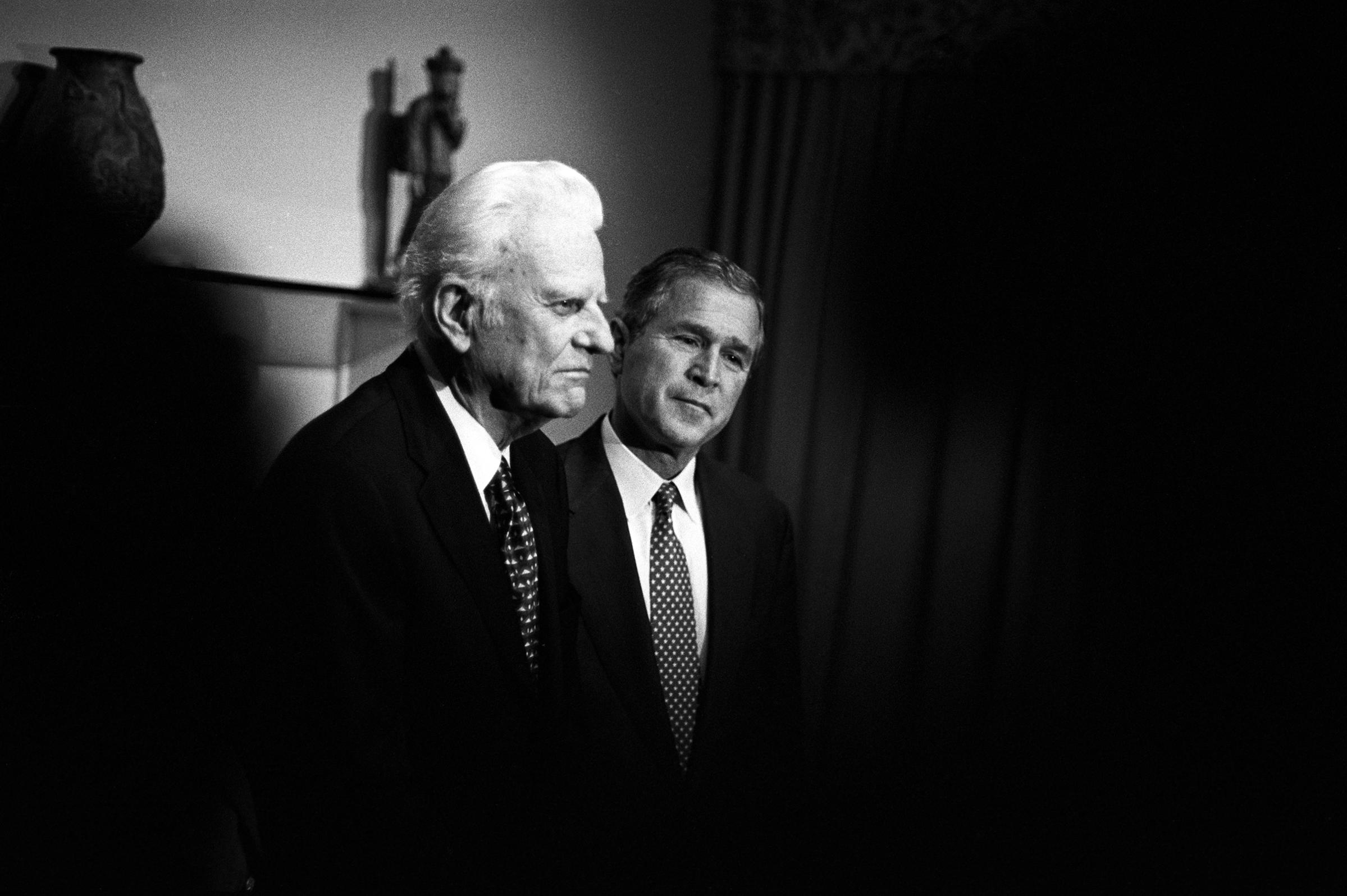
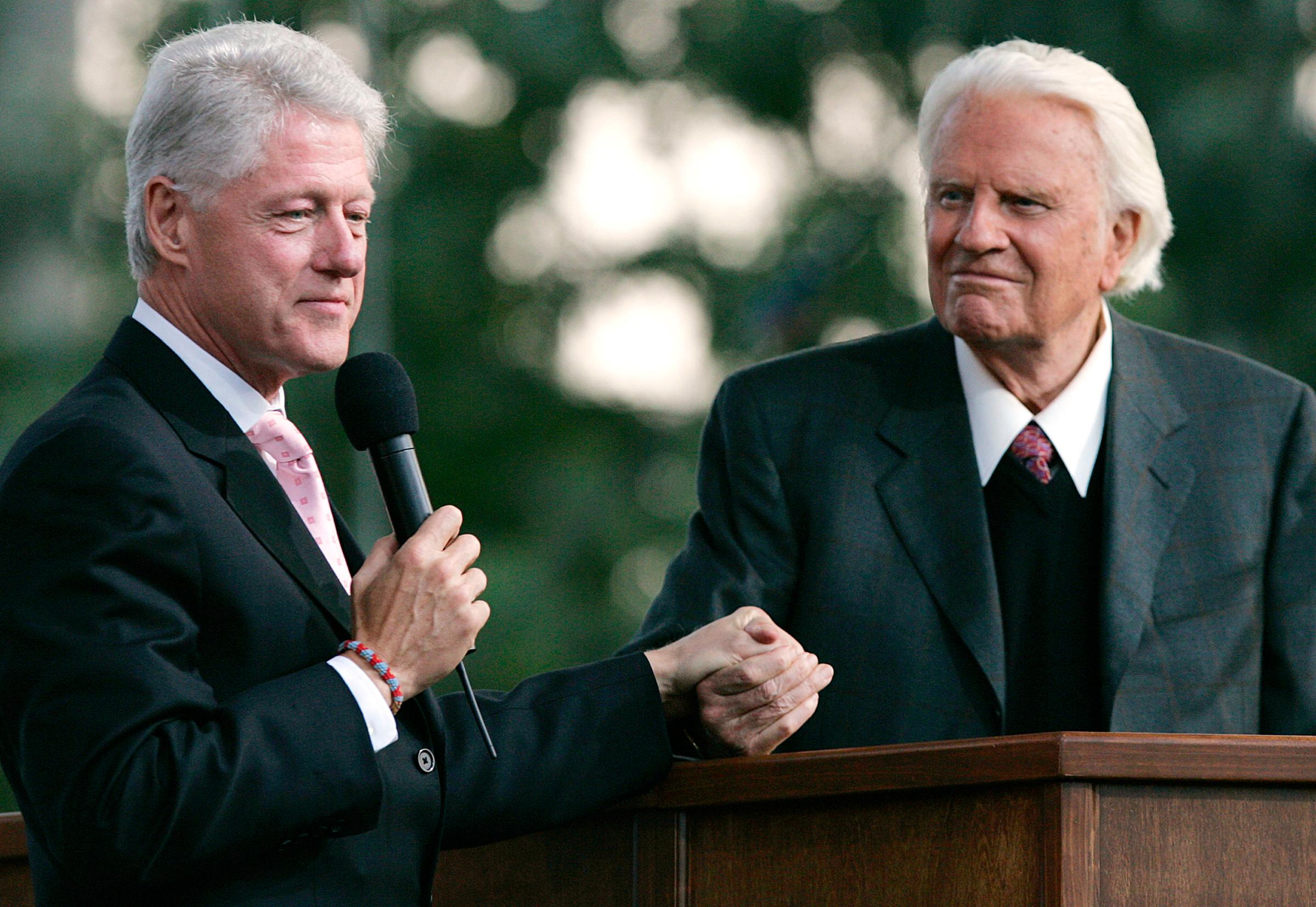
He remembered the first time he had a long talk with Bill Clinton, when he was a brand spanking new governor of Arkansas, and then recalled his many visits with the Bush family at Kennebunkport. He remembered the time he went out to see the Reagans; Nancy Reagan is a remarkable women, he said, to have spent ten years at her husband’s side, as he faded from her, from everyone. “Alzheimer’s is an awful thing,” he said. He went out and sat with Nancy for a long time talking, then went out to see Ronnie. “He totally in my judgment didn’t know I was there,” Graham said. “His daughter Patti was helping feed him, and they had been somewhat estranged.” But now she was there to take care of him. Before he left, he said a prayer for the president. He asked Nancy, “ Do you think he ever knew I was there?”
“During your prayer,” she said, “he grunted, and I think he knew…”
“What a load she carried,” he said.
We talked about the Clintons, about how he tried to help them, and the criticism he got when they appeared on stage at his New York Crusade. “That’s the two extremes we have in this country,” he said. “The extreme right and the extreme left. I never pay attention to such things. If I tried to answer all the critics through the years.…”
His critics, by and large, have faded now. He outlived or outloved them, stuck to his purposes, refused to fight or divide or detour from his essential message. But he clearly has made some discoveries of his own as he traveled back in time. “I have Parkinson’s,” he told us, “and I have prostate cancer and that gives me some difficulties. But these things are right at the twilight of my life…and your all’s interest in all of these things has encouraged me. i just hope I don’t say anything to punish people who have trusted me….It’s been a great honor for me to have you here. I’d love to see you again if you want to see me….I hope I have made two good new friends.” And he bade us goodbye, and slowly, carefully, walked us out of the room, down the hall, out to the driveway, and stood in the sun, waving goodbye.
Read more: From Humble Beginnings to ‘Pastor in Chief’: How TIME Covered the Evolution of Billy Graham
We returned a year later, another beautiful midwinter day in the smokies, snow in the high elevations; bare trees and overcoats on the streets. It was 2007, Presidential primary season was still a year away but he was already following the sweepstakes closely.We knew we had to ask the hardest questions this time, about the lowest points, about the enemies, and how far politicians would go to win. We had to ask about Nixon, and the now notorious conversations Mr. Graham had had at the lip of the 1972 campaign, like on the day of the National Prayer Breakfast, when they talked about about the Jews controlling the media, and how Graham had said “this stranglehold has got to be broken or the country’s going to go down the drain.”
By this time Graham had apologized repeatedly, ardently. But the pain would abide. “ I don’t understand it,” he said of his behavior. “I can’t even remember it. I mean I remember I guess the meeting. I remember that. But I can’t remember what I said because I never felt that way. I never thought that way and I was just trying to agree with what he said or something, I don’t know.”
Of all the presidents he knew, Nixon was the one who drew him deepest into the White House, wooed him, used him, damaged him. “I did misjudge him,” he said. “It was a side to him that I never knew, yet I’d been with him so many times. He was just like a whole new person. I talked to Julie about that and she felt that about her own father. I almost felt as if a demon had come into the White House, and had entered his presidency, because it seemed to be sort of supernatural, I mean it was so ugly and so terrible, especially the cover up and the language and all that. It was just something I never knew.”
The furor over what Graham had said, after the recordings of those conversations were made public in 2002, was the low point of a long life’s ministry. He had worked so hard to avoid the scandals that destroyed other prominent preachers; “I prayed many times that the Lord would spare me,” he said.
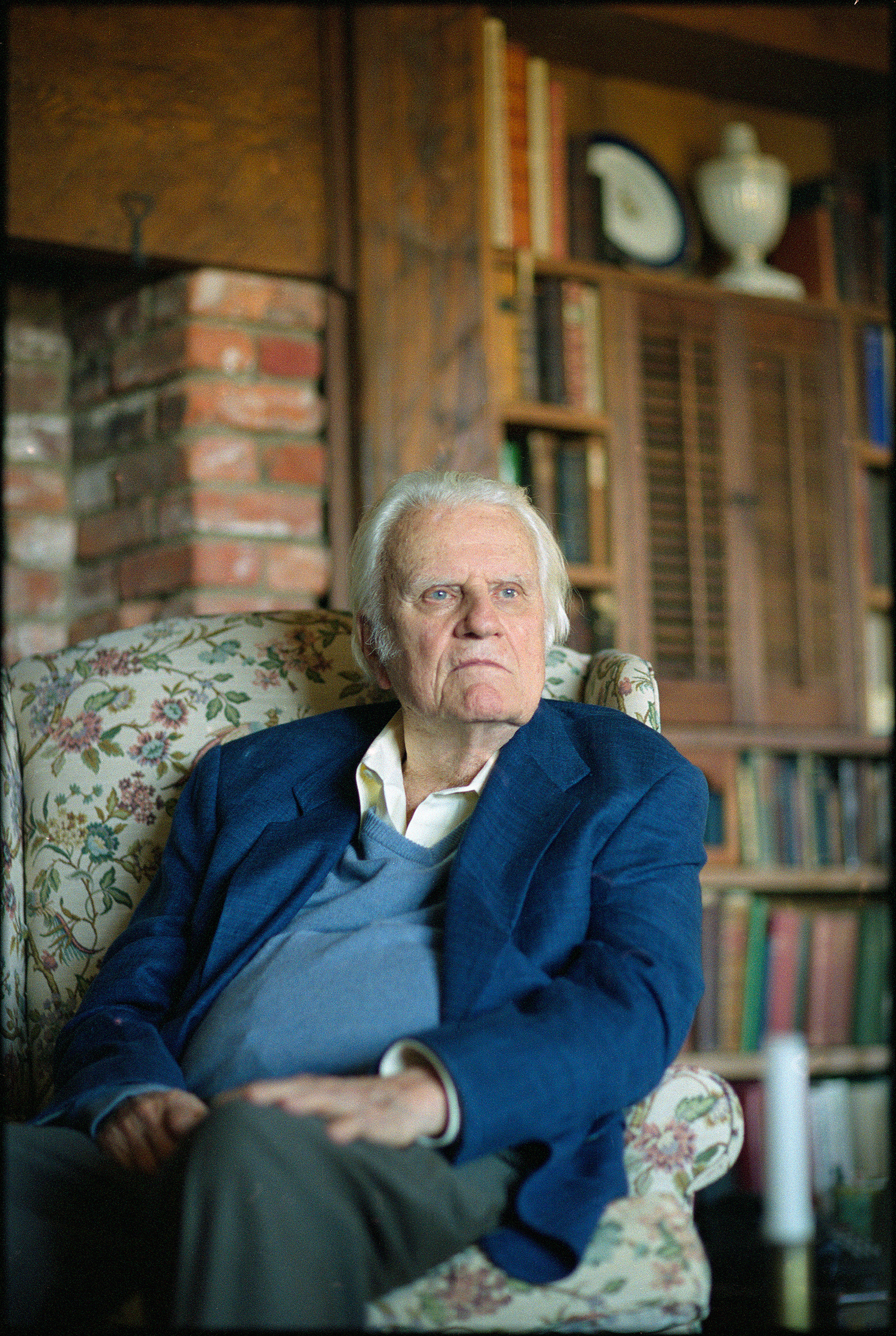
Nixon was the greatest threat, the greatest challenge to his balance, during his half century tightrope walk. How, we asked, did you manage it? How did he handle the crosswinds of politics and faith?
“I didn’t sit down and try to manage it or think it through,” he said “I just tried to be myself, I think. I have five children and each has their own temperament, their own ideas, they have grown up in different cultures…and they have different points of view and I accept all of them. And love ‘em all. And I do the same with people.”
It became clear as he talked that the lives we saw as separate, the global traveler, the great modern evangelist, and the private man on his mountaintop with his powerful friends, were all one life, inseparable. The principles did not shift with the circumstances. In the end we are all the same, he said, and need the same things.
“I forget who it was, some famous man said he never met a man that he hated,” Graham went on, and then for one rare moment, he turned the camera on himself. “And I felt that way. I haven’t hated people. I haven’t felt that I needed to take revenge on somebody. I never was jealous of people that I can remember.”
“That was a gift from the Lord,” he went on. “Jesus spent a great deal of his ministry talking about the need for love and working together and that’s why he died on the cross—because of love. He loved sinners, people who didn’t deserve it, that’s what grace is. It means God gives us forgiveness that we don’t deserve. And to me that’s a wonderful thing.”
Adapted from The Preacher and the Presidents: Billy Graham in the White House
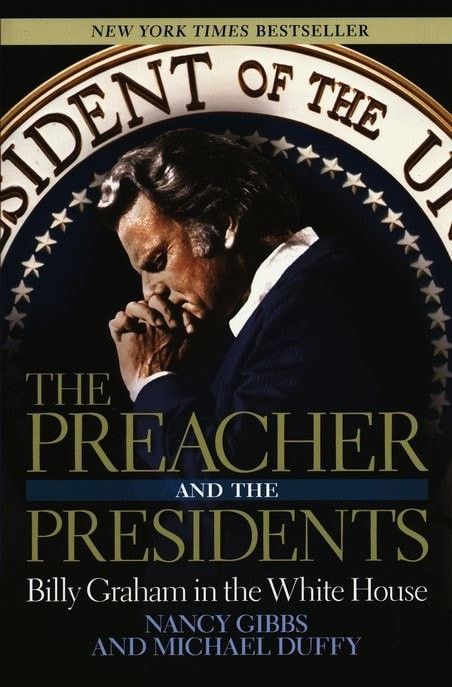
More Must-Reads from TIME
- Cybersecurity Experts Are Sounding the Alarm on DOGE
- Meet the 2025 Women of the Year
- The Harsh Truth About Disability Inclusion
- Why Do More Young Adults Have Cancer?
- Colman Domingo Leads With Radical Love
- How to Get Better at Doing Things Alone
- Michelle Zauner Stares Down the Darkness
Contact us at letters@time.com